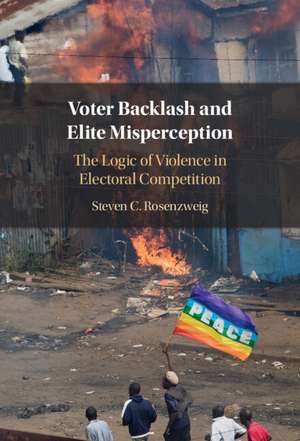Voter Backlash and Elite Misperception: The Logic of Violence in Electoral Competition
Autor Steven C. Rosenzweigen Limba Engleză Hardback – 31 mai 2023
Preț: 632.67 lei
Preț vechi: 710.86 lei
-11% Nou
Puncte Express: 949
Preț estimativ în valută:
121.17€ • 124.84$ • 101.50£
121.17€ • 124.84$ • 101.50£
Carte tipărită la comandă
Livrare economică 22 februarie-08 martie
Preluare comenzi: 021 569.72.76
Specificații
ISBN-13: 9781009354882
ISBN-10: 1009354884
Pagini: 200
Dimensiuni: 152 x 229 x 16 mm
Greutate: 0.49 kg
Editura: Cambridge University Press
Colecția Cambridge University Press
Locul publicării:New York, United States
ISBN-10: 1009354884
Pagini: 200
Dimensiuni: 152 x 229 x 16 mm
Greutate: 0.49 kg
Editura: Cambridge University Press
Colecția Cambridge University Press
Locul publicării:New York, United States
Cuprins
1. Introduction; 2. Election-Related Violence in Kenya and Around the World; 3. Theorizing Election-Related Violence: Toward a Theory of Elite Misperception; 4 Violence and Election Outcomes; 5. How Violence Affects Voting: Coercion, Persuasion, and Backlash; 6. Elite Misperception and Election-Related Violence; 7. Voter Backlash, Elite Misperception, and Violence Beyond Kenya; 8. Conclusion.
Recenzii
'Do politicians benefit from using violence against voters? Prevailing theories assume that violence works, but this meticulously executed book suggests otherwise, showing that violence does not help and may even hurt parties and candidates. The book argues that elite misperceptions explain why politicians use violence regardless, and presents sophisticated evidence for voters and politicians in Kenya to support this claim. This interesting twist on the logic of violence in electoral competition will inspire scholarship for years to come.' Ursula Daxecker, University of Amsterdam
'With an extremely important new book on election violence, Rosenzweig documents a disconnect between elite perception and citizen opinion, moving us much closer to understanding how to meaningfully reduce election violence. He finds that strategies used in founding elections play an outsized role in determining what 'works' to win elections such that some countries fall into a more violent pattern, and that politicians do not know the degree to which election violence is highly unpopular. Together, these findings suggest that politicians can be convinced that peaceful elections are in their own best interest at the ballot box. Such persuasion away from violence, driven ultimately by the unpopularity of election violence among voters, has the potential to create a new and more stable peace.' Susan Hyde, University of California, Berkeley
'This highly compelling book is important in both scholarly and substantive terms, as it provides a rigorous demonstration of the cost of electoral violence to perpetrators. This is a message that needs to get out to as many people as possible, to minimize the use of violence as an electoral tool.' Sarah Birch, King's College London
'With an extremely important new book on election violence, Rosenzweig documents a disconnect between elite perception and citizen opinion, moving us much closer to understanding how to meaningfully reduce election violence. He finds that strategies used in founding elections play an outsized role in determining what 'works' to win elections such that some countries fall into a more violent pattern, and that politicians do not know the degree to which election violence is highly unpopular. Together, these findings suggest that politicians can be convinced that peaceful elections are in their own best interest at the ballot box. Such persuasion away from violence, driven ultimately by the unpopularity of election violence among voters, has the potential to create a new and more stable peace.' Susan Hyde, University of California, Berkeley
'This highly compelling book is important in both scholarly and substantive terms, as it provides a rigorous demonstration of the cost of electoral violence to perpetrators. This is a message that needs to get out to as many people as possible, to minimize the use of violence as an electoral tool.' Sarah Birch, King's College London
Notă biografică
Descriere
Explores the causes and effects of election-related violence, analyzing why politicians employ violence and how their electorate responds.
